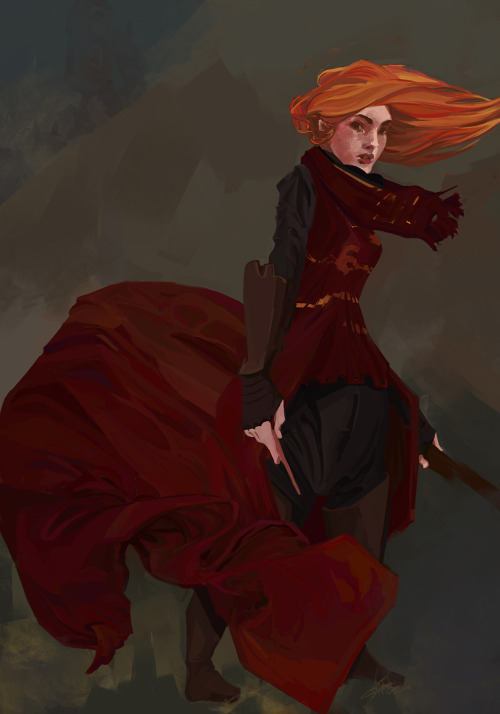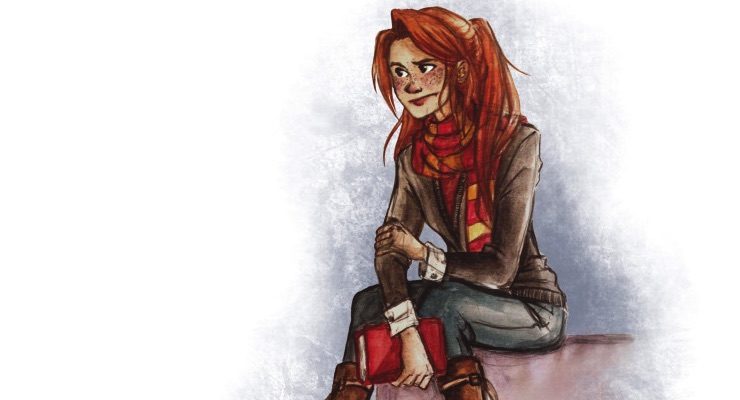Six brothers. That’s how many brothers it takes to make a Ginny Weasley. That’s how much familial finally-a-daughter pressure is required to make a Ginny Weasley. That’s the weight of hand-me-down boy’s-jeans and you-can’t-do-it-you’re-a-girl that’s necessary to make a Ginny Weasley.
Ginny let herself be impressed once. She let herself be impressed by Harry Potter—the Boy Who Lived, big brother’s best friend, Quidditch star. She let herself be impressed, and she let herself be infatuated, and she let herself blush and hide. She let herself be soft.
And into that moment of softness—of weakness—she wound up vulnerable. And look at how that turned out.
Ginny Weasley is angry. She’s angry because she let her mind become a chew toy for a sociopath. She’s angry because she hurt people, and she doesn’t care that she was just a puppet for Tom Riddle, that doesn’t matter, she still hurt people. She’s angry because nobody noticed. She’s angry because everyone forgets. She’s constantly having to remind them that she went through it, she spoke to him, he spoke back. And when he spoke back, it wasn’t just an endless deluge of taunts about her parents or jabs at her youth or threats to kill her. Harry’s never had a conversation with Voldemort, never really talked to him.
Ginny has.

Ginny is the one who’s confided in him. Ginny is the one who’s walked with him in her pocket. Not Harry. Not the Boy Who Lived Through No Fault of His Own.
Not him.
Ginny goddamn Weasley.
And yet, so often, she has to remind them that it happened at all. They didn’t notice then, and they forget now, and they’ll probably keep forgetting.
But she won’t forget.

Ginny takes Neville to the Yule Ball. She and Neville understand each other—the overlooked, the forgotten, the teased. There for comic relief. Oh look, she’s put her elbow in the butter. Oh look, he’s lost that thing again. There to tag along—okay, you can come, but only because you stamped your foot and insisted, just stay out of the way.
Ginny takes Neville to the Yule Ball because Harry didn’t ask her in time, and she’s dating someone else by the end of the night because it turns out to be not-so-bad. Nobody else can be the Boy Who Lived, but then again, there are all of these other boys who aren’t the Boy Who Lived. Who haven’t failed her. Who haven’t looked away, embarrassed, as she flees a room in tears because her brothers don’t know when to stop making fun of her.
Maybe that’s the night. Maybe it’s at the Yule Ball, when she notices that Harry is sitting there being rude to his date and acting like a sullen idiot. Maybe it’s while she’s dancing with Neville and having fun and flirting with Michael Corner that she starts to realize that she just isn’t impressed anymore.

Life at Grimmauld Place is another exercise in exclusion—the Order of the Phoenix shutting her out of meetings, Harry and Ron secluding themselves, shouting matches. And as everything starts to darken, Ginny continues to find herself unimpressed.
No matter. This is going to be her year.
And then it is. She becomes the Gyffindor seeker, and when everyone’s surprised that she can fly, she throws it in their faces: I’ve been flying for years, on your broomsticks, and I’m better at it than you, try to keep up. She helps found Dumbledore’s Army—names it, damn it, even if everyone else tries to take credit—and she fights the Inquisitorial Squad and she takes down Draco Malfoy, not that it’s hard to take down that wet corn husk of a boy.

And then at the ministry of magic, who stands nose-to-nose with Bellatrix Lestrange? Who faces the threat of torture and keeps her jaw square? Who takes a broken ankle and keeps trying to fight?
And after all that, on the train ride home, who keeps it together enough to comfort Harry?
Who keeps on carrying the weight of his sadness?
Everyone is so desperate for Ginny to be that flinching, fleeing girl she used to be. Everyone is surprised that she doesn’t have time for their condescension and their coddling—everyone but Harry.
Finally.

He puts her on the Quidditch team because she’s great, and he trusts her to take over for him as seeker when he’s in detention again. He sees that she doesn’t need him, that she’s stronger and better and smarter—and finally, finally, he’s good enough for her.
But then, of course, he fails her. Everyone does. Everyone lets Ginny down, and Harry can’t be an exception. He breaks up with her so that he can go on adventures while she’s “safe”—nevermind the fact that the last time he sees her, she’s dueling with a Death Eater and holding her own and then some. Nevermind that during his walkabout, she’s acting as the general of the army he left behind. He still wants to keep her swaddled in safety.
But when the time comes, when it matters most—when the battle is raging and she’s stuck in the Room of Requirement—he lets her out. And then she’s gone—she’s fighting, no time to lose. She’s got her wand out and she’s taking down Bellatrix Lestrange, the last person who dared to make her feel small and scared. She sees Harry’s corpse, and it doesn’t matter, because there’s a battle to fight. She sees Fred die—but she’s got to go, damn it.
There’s no time to mourn.
She’s got a war to win.

She marries Harry Potter eventually, because she wants to—not because he’s earned her, not because she’s the prize that’s handed to him once Voldemort is dead, but because she’s decided that he’s adequate. She’s the only woman in the world who can look him in the face and tell him truthfully that she’s not impressed at all, but that she loves him anyway.
She marries him, and she takes his name, but they both know that she’ll never be Mrs. Potter, Wife of the Boy Who Lived, what was her name again? Not her.

She started at the bottom of a pile of expectations, sleeping under sheets that had been on six beds before hers, the seventh child, the only daughter in a house of sons. She let a monster into her heart and she looked into the eyes of a murderer and she fought for her life and she won.
She’ll never be a footnote.
She’s Ginevra Molly goddamn Weasley, and she’s not impressed.
Top image by Quinnasaurus-creations.
Sarah Gailey’s fiction has appeared in Mothership Zeta and Fireside Fiction; her nonfiction has been published by Mashable and Fantasy Literature Magazine. You can see pictures of her puppy and get updates on her work by clicking here. She tweets @gaileyfrey. Watch for her debut novella, River of Teeth, from Tor.com in 2017.











That. Was. Awesome.
Bravo.
I was always annoyed that at the end of Deathly Hallows, Harry returns in triumph to Hogwarts and WALKS RIGHT PAST the woman he supposedly loves to go talk to Ron and Hermione. No hug, no kiss, no “Thank god you’re safe”, nothing. That really ticked me off. Ginny deserved better.
Ginny is incredible, and definitely one of my fav characters from the series. My biggest annoyance with the movies is the massive disservice they did to Ginny. Alas.
(I should probably also confess that my current phone background is some fan art of Harry and Ginny kissing. Hm. Did I mention I’m kind of a Ginny fan??)
Yep, definitely my favorite character in the story. Always wished for more time with her.
Brava. Bravissima
Cool post!
Ginny’s proactive–asks Hermione’s advice and takes it, stands up for herself, and calls out Harry when he’s being stupid or unthinking. One thing going for the both of them–individually and as a couple–is that he’s willing to listen to her when she does call him out on something. She also gives him space when he needs it, as in his conversation with Albus before he gets on the train. He also appreciates her toughness, remembering that “blazing look” she has.
That Valentine she writes for him in CoS . . . :)
@3, yes, the movies did the character a great disservice. In the HPB film it was impressive that he stood up when she came in to the Slug Club dinner, and was the only one of the guys at the table to do so. i don’t remember if that was in the book or not–I’ll have to check. Hermoine’s expressions in this scene were also great–it was obvious that she knew what was going on :).
Holy fucking shit this is amazing.
This is Amazing!!
Thank you for this.
Ginny is my favourite character in the books and the films, no one compares to what she has to deal with, and no one ever will.
I always felt the link to Voldemort would create a darker, more dysfunctional link between Harry and Ginny, one that would eventually lead to the destruction of their relationship.
She is the best character of HP books. But I really didn’t like that she ended up with Harry. I always thought that she deserved more. well true to be told I just don’t like Harry.
Ginny Goddamn Weasley. I love her. I hate how under appreciated she is in the books. She’s such an amazing character and JKR has made her a sort of a side note, never good enough to go on adventures with the Golden Trio when she’s as good as them, even better in scenarios and she’s just on the sidelines of the story even when she deserves to be the main lead. She’s absolutely amazing and applaud her courage for being so brave even after what she went through when she was just 11 and what she’s been through since she was born. She’s the most admirable person ever and if you can’t see that, there’s something wrong with you.
Thank you. She was always my favorite of the women in the books and this, finally, smacks me in the face with why.
I appreciate that
Ginny is among my favorite characters. JKR uses her very effectively through the course of the books, developing the character via a steady stream of mostly brief appearances; much like the most important people IRL, at some point you realize she is essential to the story but it’s difficult to pin down the exact moment or event that marked the transition. (Even more impressive when you consider she barely appears in three books and spends half of the final book hundreds of miles from the main action.) It’s wonderful to read.
Not impressed is nice succinct way to convey the essence of Ginny’s personality. Harry absolutely needs that in his life, and no other character provides it as well as she does. Yet, like previous similar efforts to exalt Hermione and Neville, I think this post overstates Ginny’s role and thus does a disservice to other characters and JKR’s narrative structure, which is finely tuned (especially in the later chapters of DH) to require the combined efforts of multiple critical characters to resolve the plot.
For one thing, the OP lays out a vision of Ginny who is far more of a lone, stoic action heroine than the character actually described in the text. Neither the book nor movie shows Ginny’s duels at the Ministry in any detail, certainly not establishing any significant rivalry with Bellatrix. Harry’s last view of Ginny before his exile is not of her singlehandedly taking down Death Eaters; rather, in the book he wistfully watches her dance, not duel, and while the movie shows her in a duel she is working together with Bill. Likewise, the book states that she takes on Bellatrix in conjunction with Hermione and Luna—but, no, Ginny is emphatically not the Weasley who vanquishes Bellatrix in the end. Yes, Ginny helps lead the resistance at Hogwarts, but Neville does so too and stays in the job for far longer. And while she continues to fight until the last moments of the final battle, she is hardly unimpressed by the carnage that hits close to her heart: she is visibly upset by Fred’s death, and she is clearly anguished when she thinks Harry is dead too (the book and the movie slightly differ in their details here but it is one of the few places where I think the movies got her right).
Moreover, describing Harry’s (admittedly overwrought) protectiveness of Ginny as ‘failing her’ ignores an essential element of the larger story. Her present and future well-being had become absolutely essential to him, whether or not it would directly involve him. Voldemort could not feel that way about anyone, giving Harry an advantage: he could access that deeper level of magic that such love provides. Ginny, understanding Harry perfectly, worked with this deftly: in their brief moments before he went on the lam she provided him with memories and feelings that would sustain him through dark places, while she headed to the ‘safety’ of Hogwarts where should could actually help lay the groundwork for the final stand (more effectively than anything she could do while on the run with the Trio).
There’s something somewhat ironic about those insisting that Ginny should have been (or is) more of a central hero, kicking ass and taking names, because in both Order of the Phoenix and Cursed Child she calls out Harry for aspiring to do just that. Like the rest of the significant characters, JKR didn’t write Ginny with the ability to do it all, which makes her relatable and thus more compelling. And isn’t that a good thing.
@2: Harry’s choice not to intrude on Ginny’s moment with her family while he instead goes with Hermione and Ron to wrap up the last bit of the quest with Dumbledore makes a lot of narrative sense. But I agree that the cursory description of his reunion with Ginny immediately after Voldemort’s death seems wrong, especially after he angsted over her for the previous 400 pages or so. That WTF passage comes during a stretch of the chapter that seems to me unfinished, as if JKR sketched out the story ideas but never got around to properly revising and extending them before the book went to print; I think it is more a writing/editing failure than a storytelling problem.
Adored this!! – except: that Ginny was Gryffindor chaser, not the seeker.
Bethany – you’re right, she was normally the chaser, but she did play seeker when Harry got detention! She preferred chaser though.
Wow! More please!
I loved it!!!!
I’m not impressed.
It really disturbs me that everyone pushes Ginny as this amazing character when…she’s poorly developed. She was never important. She was always ‘that Weasley girl’. Harry never cared for her at all, well, not like THAT. She was a souped up Bella from twilight in her Mary Sue-ness in book 6, where it is beat into our skulls several times by randoms in ways that hadn’t happened before so we’d forcefully get it into our skulls that she’s perfect for Harry. She never ‘moved on’ from him. She always left the boys she was with for some reason or the other by the end of the year, when she KNEW Harry would be single and visiting her home. What a coincidence!!! She WILL be forever known as Mrs. Potter, because that’s what she is. A weirdly obssessed girl whose only goal was to have him. Who didn’t really move any plot along and was JUST a love interest. Don’t romantize that.
She didn’t do great feats. She is not part of the trio or relevant. She couldn’t folow orders. She was petty and extremely jealous for no reason. She jinxed kids high and low because ‘they annoyed her’. She barely even spoke or appeared through the first couple of books. She has as much appeal as a lamp.
That she is glorified as this strong female character who made her own way shows how easy it is to manipulate readers. For four books she did nothing. In the other she just named the DA (which honestly was the worst possible and idiotic name for a secret army) and forcibly went along with the trio, Luna and Neville. Then in six she is transformed. Everyone wants her. She is charming, witty, powerful, THE MOST BEAUTIFUL WOMAN IN THE WORLD, and the most amazing quidditch player ever, apparently. Please. Don’t worship bad characters. Don’t insert things that never happened, but you much rather FEEL like it was like that (there is a huge DIFFERENCE between what truly happened/who the character is and what you FELT happened with a character) and how mediocre the character in the books was done.
Props to you, though. You did a better job at developing the char than JK ever did in the books. Imagination is a great thing.
Great article. Just felt like I had to deal with one of the hateful comments…
————————————————————————–
“everyone pushes Ginny as this amazing character”
Which she is. It’s a good thing that after years of bashing and hatred from the fandom, finally she gets the recognition that she deserves.
“she’s poorly developed. She was never important.”
[citation needed]
“Harry never cared for her at all, well, not like THAT.”
You haven’t actually read the books, have you? If you did you would know that Harry’s love for Ginny is true.
“She was a souped up Bella from twilight in her Mary Sue-ness in book 6 … so we’d forcefully get it into our skulls that she’s perfect for Harry.”
Ginny isn’t a Mary-Sue, she’s just seen through Harry’s rose tinted glasses. The same would have happened with any girl that Harry ends up with.
“She never ‘moved on’ from him. She always left the boys she was with for some reason or the other by the end of the year, when she KNEW Harry would be single and visiting her home.”
“For some reason or the other”? Their relationship failed, they were not suited, and that’s that. End of story. Also if that’s the case then why didn’t Harry and Ginny get together before Dean happened?
“That’s what she is. A weirdly obssessed girl whose only goal was to have him.”
She wasn’t obsessed. Everyone reacted the same way in PS even Ron and Hermione. But by CoS she doesn’t have the same reaction as those wishing him for his fame.
“She didn’t really move any plot along and was JUST a love interest. Don’t romantize that. She didn’t do great feats.She is not part of the trio or relevant”
You haven’t read CoS, HBP or DH have you?
“She couldn’t folow orders.”
Neither did Harry, Ron and Hermione, yet I don’t see you bashing them like you are doing with Ginny.
“She was petty and extremely jealous for no reason”
[citation needed]
“She jinxed kids high and low because ‘they annoyed her’.”
You’re talking about James, aren’t you? One hex is not repeatedly jinxing kids. You really need to read the books again.
“She barely even spoke or appeared through the first couple of books.”
So what? Lupin didn’t appear before PoA. Alastor didn’t appear before GoF. Luna didn’t appear before OotP. Do you hate all three of those characters?
“She has as much appeal as a lamp.”
You’re talking about the movies, correct?
“That she is glorified as this strong female character who made her own way shows how easy it is to manipulate readers.”
But that’s exactly what she is. You appear to be biased from the movies where the real manipulation is coming from.
“For four books she did nothing.”
Again, you haven’t CoS have you?
“In the other she just named the DA (which honestly was the worst possible and idiotic name for a secret army and forcibly went along with the trio, Luna and Neville.”
You didn’t actually read OotP did you? If you did you would know all about the Ministry’s worst fear. And you make it sound like ONLY Ginny forced her way, when Luna and Neville did the same. You sound more like a hypocrite by the minute.
And what did you expect her to do, sit around and wait? That’s exactly what you’ve been complaining about this whole time. So you hate her when she doesn’t do something and you hate her when she does. She can’t do anything right according to you, am I right?
“Then in six she is transformed.”
It’s not a transformation, it’s Harry’s vision that changes. She always had the same personality all through the books. See my previous comment please.
“how mediocre the character in the books was done”
You misspelt films, by the way.
great story but why did you have to equate softness with weakness?
You can be soft and still very strong.
Thank you for this post. I think the Chamber of Secrets changed her in the way of a strong person; she became stronger. she was never “a silly little girl”. She is strong and an excellent witch like her mother. She is a child growing up with economic stress. My mom grew up that way and it made her strong. But strong people have their own insecurities; everyone does. I think she sees the best in everyone, but is not intimidated by them. could she have gone with Harry, Hermione and Ron as an asset to the team, absolutely. But our instinct is to protect the one that we love, so it was natural for Harry to “break up” with her. They new the truth and that is more important than anything else.
I’m actually a fan of Ginny’s character and it was fun to read an unabashedly positive article about her. Its refreshing considering how much she is bashed and disliked by a sizable portion of the fan base.
The truth, however, I think falls somewhere between Sarah’s article and Jay’s response. She wasn’t the same star-struck little girl at the end of the books as she was at the beginning, but I have to say that JKR didn’t do an especially good job of showing that happening. When her romance with Harry finally comes, it could have been developed a bit better. One of the many (IMO) flaws in the final book was the total lack of any sort of reunion of the two lovers, after Harry spent half the book mooning over her dot on the Marauders Map, he just wanders off for a sandwich and a nap. Rowling herself acknowledged this, saying she just skipped it because she “can’t write romance”.
Finally, there’s some really nice fan art accompanying this article, but a few of these artists really need to look at a some real life redheads to see what freckles actually look like! ;-)
I always felt that Ginny got short shrift in the middle books of the series. One reason for this was the ridiculous and pointless Cho Chang subplot, which runs for two books yet adds absolutely nothing to either the overall story arc or Harry’s character development (except to make him look like a insensitive dork). The entire Cho Chang sidebar could be deleted from the books entirely and barely leave a smudge behind. It’s incomprehensible to the reader–when Harry starts obsessing over Cho, the reader just thinks, “where the heck did this come from? Who’s Cho?” It would have made a lot more sense to have Harry’s interest in Ginny evolve naturally; their friendship, gradually turning to something deeper, could add poignancy to the failed friendship between Severus Snape and Lily Evans. But for some reason, Rowling didn’t want to do that.
I never felt that Rowling liked Ginny very much. She’s certainly confident, passionate and fearless–she learned to play Quidditch by stealing her brothers’ brooms and practicing on her own, because her brothers wouldn’t let her play Quidditch with them, and she handles Slughorn’s interest in her with perfect and unbeguiled poise. But she’s constantly being jerked around by her mother, Ron and Harry. Her mother infantilizes her, Ron over-protects her and Harry accepts her affections and then shoves her away because “it’s too dangerous.” It never occurs to him that she might be a powerful ally, not just a vulnerable female to worry about.
I’d have to agree with Rowling when she says she can’t write “romance.” She’s very good with issues of good and evil and the temptations of power, and pretty good with family dynamics, but the wizarding world is not a friendly place for relationships.
@@@@@ 26: I totally agree that we could have avoided a lot of the fan hate for Ginny if she had been properly handled in between CoS and OOP. Certainly in a lot of ways the relationship between her and Harry seemed to come out of left field. More time spent developing her character and her friendship with Harry would have helped.
As far as taking her with them in the final book, there were actually some good reasons why they couldn’t. For one, she was still underage and the Ministry could have tracked her if she did any magic. After all, Harry, Hermione and Ron specifically waited until after Harry’s 17th birthday for just that reason. As a pure blood, she was required by law to attend Hogwarts that year. They had to come up with a reason why Ron was not returning. Having two members of the same family come up with excuses might have been too suspicious. Finally, I think Harry’s reasoning was not so much “its too dangerous (for a helpless little girl)” but more like he would have been so obsessed with making sure she was safe during their quest that it would have impaired his ability to accomplish his goals. After all, in the final battle he was ready to abandon his duel with Voldemort to attack Bellatrix when she almost killed Ginny. It was Harry’s issue rather than Ginny’s.
This article makes great points about how everyone forgets Ginny was used by Voldemort and spoke to him. However, I feel it overstates how unimpressed she was with Harry in the middle books. She said herself that she never gave up hope for him.
Ginny is certainly a very interesting characters but I feel saying ”so that he can go on adventures while she’s safe’ or ‘he still wants to keep her swaddled in safety’, is a little bit exagerated.
Harry is certainly not happy to ‘go on adventures’, I never felt while reading as if he was enjoying any of this. I understand this text is about Ginny but I cannot imagine her not understanding why Harry would want her safe, thinking he’s going on an adventures… She knows him, she knows the reason why he fights. And, for someone who lost so many, who his parents at the hand of Voldemort, is it so surprising that he want to protect the one he loves? Of course it’s my interpretation, but I can imagine how difficult it must have been for Harry to let her fight. And I’m sure Ginny would have known.
Anyway, that’s my take in this particular part of this text. I loved reading it.
That. Was. SO. Good
Thank you for writing this.
@15 – I think you hit my head as to what rubs me the wrong way about this piece. I really like essays that look at the minor characters from their own perspective and remind us they have their own stories (and overall I really enjoyed reading this). But I feel like sometimes they go so far in the other direction as to over-inflate their importance and cut the other main characters down (as well as the importance each of the ‘main three’ plays in the plot structure). One of the big draws (for me) in HP is that they work as a team; I doubt Ginny would feel this way about Harry or not be impressed what what he has accomplished. But that doesn’t mean she is going to hero worship him either – and that’s a good thing.
I agree with 25, 26, and 28.
@32: Yeah, I’m with you on these sorts of character analyses: initially promising but subsequently frustrating when the essayist seems to conclude that a limited or supporting role is incompatible with being critical to the story, veering away from a plain reading of the text into an attempt to assert that the character must have special skills or traits that the readers and main characters have overlooked. Perhaps those essayists should play a few games of chess and note how, while the queen is certainly the most powerful piece, the decisive moves of the endgame are often made with a pawn or a rook that had been barely used since the start of the game. And it is the combination of pieces that results in a win.
Attempting to broaden Ginny’s role into some sort of wizarding shieldmaiden, rather than a person with the strength of will required to handle being Harry Potter’s life partner, not only exceeds the text but also misses the point of why and how JKR wove her character into the story. Harry has plenty of allies to do the heavy spell-casting. Ginny provides him with a different type of strength at several critical moments in Order of the Phoenix, Deathly Hallows and Cursed Child, and moreover she personifies several themes developed throughout the series (the Power of Love, an echo of Lily, etc.). Those aspects alone are enough to establish her as a major/significant character whether or not she took down a single Death Eater.
“Who haven’t looked away, embarrassed, as she flees a room in tears because her brothers don’t know when to stop making fun of her.”
When did Ginny do this? I must have missed some part of the books.
“He breaks up with her so that he can go on adventures while she’s “safe””
Like other people said, it wasn’t really feasible for her to go on the Horcrux quest considering that she still had the trace on her and it would have been too suspicious for the Weasley family.
“She’s the only woman in the world who can look him in the face and tell him truthfully that she’s not impressed at all, but that she loves him anyway.”
I do like how Ginny can stand up to Harry when he was being stupid like in OotP and yet the haters just plugged their fingers into their ears and go “I can’t hear you”
“She started at the bottom of a pile of expectations, sleeping under sheets that had been on six beds before hers, the seventh child, the only daughter in a house of sons.”
Yes but she got tons of attention from everyone in the family because she is the baby girl in the family. If you want to look at someone who is starved of attention, look at Ron. Also I have a suspicion that she would at least get new clothes because she is the only girl and it’s much more difficult for her parents to pass on second-hand clothes to her.
@ian Yes, I totally agree with your posts regarding this article about how everyone is important in the quest to defeat Voldemort and the Death Eaters. The chess analogy is perfect; in a chess game, if you don’t use one of your pieces but your opponent uses all of his, then he is effectively playing a piece up and would be able to win easily.
@Jay
‘She always left the boys she was with for some reason or the other by the end of the year, when she KNEW Harry would be single and visiting her home.’
She was in a teenage romance with them and it is not exactly uncommon for them to not work out especially as the reasons for those relationships not working out is stated right in the books. Where is your proof that she dumped Michael because of Harry?
‘She couldn’t folow orders’.
The most insubordinate and stubborn person among the teenagers in the series is Harry Potter himself.
‘She was petty and extremely jealous for no reason.’
Yeah, she was jealous of Cho alright that wasn’t nice. Could you give me another time where she was jealous of a girl? Was she ever jealous of Hermione or Luna who spent tones of time with Harry alone?
‘She jinxed kids high and low because ‘they annoyed her’.
She hexed Zacharias Smith once in HBP because he was forcing her to recall one of the most traumatic events in her life. Name another incident please.
‘She barely even spoke or appeared through the first couple of books.’
Yep because the books are mainly about the Trio, nobody else appeared very much then, not even Neville who turned out to be an amazing hero in the end. Also could you answer me why is it that whenever she did appear in the first 4 books Harry was always there to make very positive observations about her and/or noting details about her that weren’t really relevant to the scene? You also forgot the role she played in OotP before her “transformation” but whatever…
@S I think he is just of those Ginny haters out there who is probably still bitter that Harry didn’t end up with whoever he wants, she isn’t my favourite character but the level of hate directed at her is ridiculous.
Regarding this idea that Rowling couldn’t write romance.
I agree Hinny as written in the books is rather lacking in details especially in the last 2 books and the scene at the end where Harry left Ginny with Molly to meet his best friends and have a nap. However I think it had more build-up in the first five books than most people think.
I also think the other central romance in the books between Ron and Hermione is written in much greater detail and with much deeper development than Hinny ever was so it shows Rowling could incorporate romance within the main adventure plot. Alternatively it could be just that she felt romance wasn’t important enough to spend lots of page-time on?
I kept thinking about Cursed Child while I was reading this, because “not impressed” is exactly Ginny in that play, which does a lot to show why Harry needs her so very badly. To everyone else in the world, even Ron and Hermione, even his own children, Harry Potter is this legendary hero. It’s there to varying degrees and everyone reacts to it differently, but nobody can entirely see past the Boy Who Lived — which is a problem because when (not if) he fucks up, it’s not a human being making a mistake, it’s the Messiah scuffing his halo. Harry has to spend a great deal of that story trying to get out from under the shadow of his own statue so that people will actually talk to him, not the myth.
Except with Ginny, who never sees the hero, or the myth, or the messiah. She learned to get over that bullshit when she was 13. She just sees Harry, and their conversations are the only time he can have “well, I fucked up again, help me” as a starting point without offending anyone’s worldview.
Well written.
Her love affair was a by-blow. For real, Rowling admits that she saw Hermione and Harry together. Hence why it feels the whole thing was a stutter after Harry’s obsession with Cho. While I appreciate the attempt at flushing a character out that really wasn’t written to be more than a sister to a best friend, much of it is still lacking in context as this is all after the fact.
Further, she was a Chaser and a SUBSTITUTE Seeker.
Citation for jinxes – yes, they were her brothers, part of pranks I’m sure. Either way, she’s “human” so there you go.
George Weasley: “Yeah, size is no guarantee of power. Look at Ginny.“
Harry Potter: “What d’you mean?“
George Weasley: “You’ve never been on the receiving end of one of her Bat-Bogey Hexes, have you?“
Personally, I also don’t give much ado about Harry, either, as he was actually a pretty selfish person – he fought Voldemort because “he killed my parents” and he was after him. There were plenty of other people who fought him because, oh yeah, he’s a bad guy in general and it would be horrid to have him in power again.
I liked that Rowling had actual people flushed out for her characters, flaws and all. But her detail in Ginny was lacking. Good job trying to come up with more behind her, though.
@Andrea Taylor Rowling never admitted Harry and Hermione is real or anything like that, the only thing she said is “in some ways Hermione and Harry are a better match [than Ron and Hermione]” which really means nothing as the same can be said for lots of different pairings. Everything else is fabrication by the media that would have made Rita Skeeter proud. Yes, details in Hinny is lacking but considering how much details and page time are spent developing the other central romance in the story it might just be a deliberate choice on Rowling’s part to minimise its details after Harry and Ginny got together. I feel giving those details in the last 2 books would definitely help to make Hinny more convincing.
I agree that Harry is somewhat self-centred in everyday life as he tends to demand a lot more from his friends while giving far less in return himself. It is probably helpful to show more scenes of Ginny interacting with other people although objectively speaking she had just as much page-time as Neville and more than Luna did.
This essay made me tear up.
@32
” I think you hit my head as to what rubs me the wrong way about this piece. I really like essays that look at the minor characters from their own perspective and remind us they have their own stories (and overall I really enjoyed reading this). But I feel like sometimes they go so far in the other direction as to over-inflate their importance and cut the other main characters down”
Exactly. Ohh one more thing, why is it so many times, that in order to show us the qualities of a female character, you have to trample the male hero? Why isn’t it enough to show us how baddass she is, just by showing us her up sides? Harry has his flaws, but you took it in my opinion too far. So yai for all female characters, a big applause please… and now no more trying to prove “who’s the man” , I like this whole article and posts, but those vibes were in my opinion too unpleasent. Harry is great. Ginny is great. Make peace no war. :-)
The boy Ginny has a crush on doesn’t return her feelings, so she does exactly what every girl in that position should do; she checks out the other fish in the Sea. None of them are right and eventually the boy she’s always wanted wakes up to how perfect she is but the point is she got on with life rather than pining so one way or another it was bound to work out for her.
@43
As I see it, it was too weird if he WOULD return her feelings those first years. Try to imagine there is someone who has a huge crush on you, it started way way before he even spoke to you, just because you’re somehow special (everyone tells you that and you still don’t really get it less than feel it) , so how could you return her/his feelings? Those were no based on reality feelings at first. Just a crush on the famous boy who lived. So once he found a girl who didn’t giggle or spoke behind his back, but actually tackled him in quidditch in order to win (Cho) he felt attracted, because she saw him as a person and no icon or psycho… So yeah I completely disagree with a post before, saying “ridiculous and pointless Cho Chang subplot”… it was not pointless, as she was the only girl (except Hermione) who continued to act normal while he was arround. And that was important for him, as he got truly irritated those first years about all this hipe around him…
So as much as I like Ginny/Harry thing in the end, he was NOT a dork as he didn’t return her feelings, but she was childish to the brink of stupidity to love someone she didn’t know.
@44, Fortunately she was a child at the time so we can forgive her. Be that as it may Ginny is a fantastic role model for teen girls as she demonstrates the correct way to handle an unreturned crush. Move on
@45/ hi princessroxana, you’re right of course that it’s just natural behavior of a girl that age, BUT that’s why I’m defending Harry here, there are to many posts saying he didn’t return her feelings, he needs someone else (hermione) to understand emotions, he’s self centered… HEY, if Ginny can be excused for being stupid, because it is not stupid regarding her age, then HELLO, Harry can be excused ’cause he was a child as well! Sorry for being all emotional, just think someone needs to cut him some slack, he went through a lot…
It never even occurred to me to blame eleven or twelve year old Harry for not returning Ginny’s crush. What an odd idea. He’s perfectly nice to her when he notices her which is all that can be expected a his age.
@47: Harry, unlike her brothers, is also shown in that book to be consistently supportive in a way that gives her opportunities to recover from mistakes or establish herself on her own terms. It’s not hard to see why the more assertive person she matures into would find that trait appealing once they are both mature enough to pursue a meaningful relationship.
@47/ “It never even occurred to me to blame” – I didn’t say that you were the one to blame, I meant others whose critic is in my opinion sometimes to harsh.
I understood that, Schwartz, I was just being amazed that anybody would blame a little boy for not responding to a little girl’s crush
im sorry to the people who made this art but it does not look anything like ginny
@51 – how come?
Wow. This is amazing you have to write more about really anything. This changed the way I see Ginny and I am blown away. You truly have a gift.